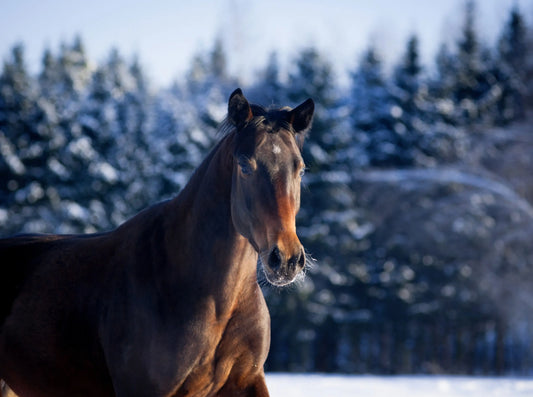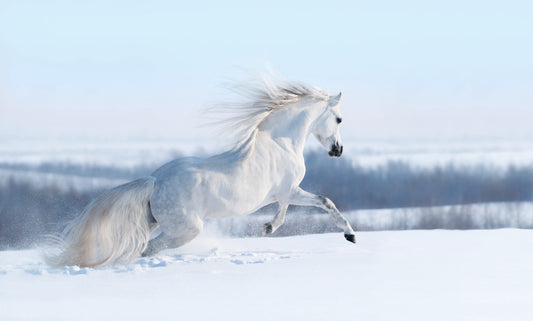The ultimate winter feed for horses: How to keep them healthy and energetic
3 min

What should be on your horse's winter menu? During the cold months, the nutritional needs of horses change drastically. Discover how to put together the perfect winter feed and what to look for to meet all your horse's needs.
Hay: The basis of winter nutrition
Hay is the most important feed in winter. It provides essential fibre and energy and keeps your horse's digestion active.
But not all hay is of good quality. High quality hay is green in color, smells fresh and does not contain harmful mold, poisonous plants, foreign objects or excessive dust.
The moisture content should not exceed 30%. If you do not have hay of this quality, alternatives such as soaked hay or alfalfa are a good choice.
A Fiber-Mix, such as Vitalbix, is an excellent supplement. It is rich in crude fiber, dust-free and contains high-quality nutrients to optimally cover the fiber requirement.
More vitamins and minerals for the winter
Compared to fresh grass, hay has a different nutritional profile. During the drying process, hay loses important nutrients, such as vitamin A, which is essential for skin, coat and mucous membranes.
It is therefore advisable to feed them extra in the winter. Vitamin E and selenium also help to keep muscles supple and support the immune system.
Zinc is essential for healthy skin and helps during coat change. A modified mineral food such as Reverdy Oligovit can effectively supplement these deficiencies.
Vegetable oils: Omega-3 and Omega-6 in balance
Vegetable oils are an important source of energy in winter. Especially linseed oil, rich in anti-inflammatory Omega-3 fatty acids, supports healthy skin and a shiny coat.
For the right balance, a combination with Omega-6 fatty acids, such as those in sunflower oil, is recommended. TRM Omega 3 offers an ideal mix of these fatty acids in a balanced ratio.
Strengthening the immune system
Winter challenges the immune system of horses. With food you can support the resistance. For example, hay butts are rich in vitamin C and a natural addition to the diet.
Brewer's yeast and linseed strengthen the intestinal flora, an important basis for a strong immune system. Minerals such as copper, zinc and selenium also play a role in immunity.
Digestion: More than just food processing
A healthy gut is crucial, especially in winter. Hay contains less moisture and more fiber than grass, which can slow digestion and sometimes lead to constipation or colic.
Moist feeds such as mash support digestion and increase fluid intake. Probiotics can stabilize intestinal flora, especially in older or sensitive horses.
Precaution over aftercare
Whether it is a young sports horse, a quiet recreational partner, an older pensioner or a sensitive eczema pony, winter is the time to lay a healthy foundation for the coming year.
- Choosing a selection results in a full page refresh.
- Opens in a new window.


